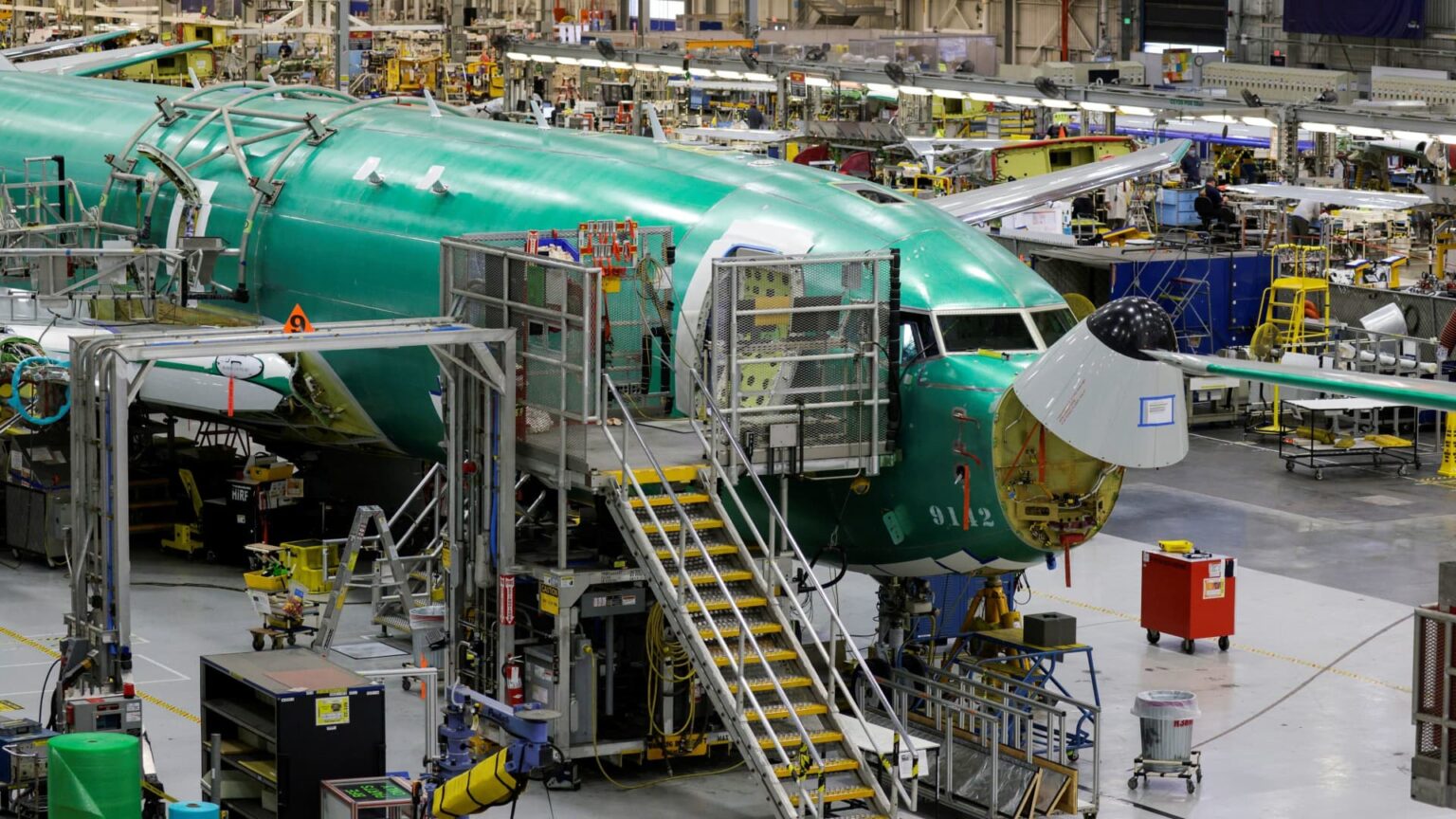The production line for the Boeing P-8 Poseidon maritime patrol aircraft is pictured at Boeing’s 737 factory in Renton, Washington, November 18, 2021.
Jason Redmond | Reuters
President Donald Trump’s sweeping tariffs are set to drive up the cost of Boeing and Airbus planes, GE Aerospace engines, and hundreds of other aerospace and defense products, threatening an industry that helps soften the U.S. trade deficit by more than $100 billion a year.
“It certainly makes things more expensive for the industry,” Dak Hardwick, vice president of international affairs at the Aerospace Industries Association, which represents Boeing, GE Aerospace, Airbus and dozens of other aerospace and defense companies, said of the tariffs.
The industry group said it is asking the Trump administration to uphold provisions in a nearly half-century old trade agreement that allows for duty-free trade of civilian aircraft and imports tied to defense and national security.
“The line is certainly long” for requests to the White House, Hardwick said.
The White House didn’t immediately comment, but Trump’s executive order announcing the tariffs said trade and economic policies around the world have exacerbated a decline in overall U.S. manufacturing.
Regarding innovation in the defense sector, the order stated, “If the United States wishes to maintain an effective security umbrella to defend its citizens and homeland, as well as for its allies and partners, it needs to have a large upstream manufacturing and goods-producing ecosystem to manufacture these products without undue reliance on imports for key inputs.”
The aerospace industry has long been a top exporter for the United States. At Boeing alone, more than two-thirds of its airplane orders over the past decade came from customers outside of the United States, according to company data.
“Free trade is very important to us,” Boeing CEO Kelly Ortberg said at a Senate hearing Wednesday. “We really are the ideal kind of an export company where we’re outselling internationally. It’s creating U.S. jobs, long-term high value U.S. jobs. So it’s important that we continue to have access to that market and that we don’t get in a situation where certain markets become closed to us.”
President and CEO of Boeing Kelly Ortberg testifies before the Senate Commerce, Science, and Transportation Committee in the Dirksen Senate Office Building on April 02, 2025 in Washington, DC.
Win Mcnamee | Getty Images News | Getty Images
The industry has mostly bought and sold planes and parts without having to pay tariffs under a 45-year-old trade agreement, which would be derailed by Trump’s new tariffs. The president this week introduced levies of 10% on countries around the world, with higher duties on certain countries and regions, some of which like Europe, are key to the aerospace industry.
Imported steel and aluminum, other key materials in airplanes, are subject to separate sector-level duties that Trump announced earlier this year.
Tariffs are paid by the importer, and the increased prices due to the levies would either have to be absorbed by the airplane or engine maker, by the still-fragile supply chain or by the end consumer, said Hardwick.
Jefferies analyst Sheila Kahyaoglu said in a note Thursday that a price jump on “any product within 12 months is eaten by the [original equipment manufacturer], assuming new inventory buy. Outside that time period, ultimately the buyer and hence consumer.”
Boeing and the S&P 500
Prices for planes are negotiated in advance, and airlines have to often wait years for aircraft, so material costs can shift dramatically over that period.
“This is not where you put money down for an automobile and it ends up in your driveway” in three months, Hardwick said.
Shares of Boeing, engine maker GE and airlines tumbled again Friday, adding to the market rout after Trump announced the tariffs Wednesday.
“This is the one manufacturing sector where America has, has enjoyed a tremendous trade surplus,” said Richard Aboulafia, managing director at AeroDynamic Advisory. “So the idea of fighting a trade war for this industry, it’s living in a crystal palace hurling giant boulders.”
Global supply chain
The tariffs are also a new strain on the aerospace industry, which still has a fragile supply chain in the wake of Covid, with some parts in short supply. Major supplies have tried to quickly hire workers and ramp up production during a post-pandemic travel boom.
But airplane makers still haven’t kept up with demand.
An Airbus SE A321 plane fuselage is lifted with a crane at the company’s final assembly line facility in Mobile, Alabama
Luke Sharrett | Bloomberg | Getty Images
Even a “Made in the USA” label for an airplane is a misnomer.
For example, the supply chain for a Boeing 787 Dreamliner, which is assembled in South Carolina, spans from Japan to Italy.
Its European rival, Airbus, has a Mobile, Alabama, factory but is still on the hook for tariffs for imported parts, from wings to fuselages.
“It doesn’t matter who owns the company. If an item crosses the border, it will have to be paid by importer of record,” Hardwick said.
Airbus has expanded the factory since the first Alabama-assembled Airbus A321, an aircraft for JetBlue Airways named “BluesMobile,” rolled out nine years ago. Its bet on increasing U.S. output of its jets, which are still largely made in Europe, also includes assembly of smaller A220s in Alabama, for customers that include JetBlue and Delta Air Lines.
American Airlines workers perform maintenance on CFM-56 engine in Tulsa, Oklahoma
Erin Black | CNBC
Meanwhile, continuing along the supply chain, General Electric and France’s Safran have a joint venture in which they make top-selling CFM engines, which power both Boeing and Airbus narrow-body jets. Each company manufactures certain portions of engines, which are sent to factories in Ohio, Indiana and North Carolina for GE and outside of Paris for Safran.
Thousands of imported replacement parts for engines and other aircraft parts, many of which come from abroad, could also become more expensive.
“There’s no such thing as a national jet,” Aboulafia said.


